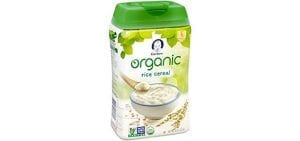Most parents, especially first-time parents, are always excited to start solids with their baby. Who wouldn’t be when this is one of the baby’s early developments in their growing up years? A baby, however, is more sensitive when it comes to food unlike us. This is where age appropriate food like the iron fortified cereals for children comes in.
A baby cereal is normally the top choice of parents to give to their baby in introducing solid food. There are many brands of cereals so we’ll give you the best cereal options for your baby in the market. After all, a happy baby is a healthy baby.

The best solid food for a baby. Doctors recommend it for some good reasons. Baby cereals are easy to feed and digest. They are fortified with vital nutrients that every infant needs. They also contain whole foods, wheat grain, and other grains or organic whole grain oats, as well as Vitamin D, Vitamin C, minerals, and iron.
Infant cereals are also considered a low-allergen food for babies. History shows that grain was initially included in a baby’s healthy diet to help the formula stay in the baby’s tummy. Iron-fortified infant rice cereals with different grains can be complementary foods to breast milk or formula foods.
Parents, however, should not settle with the most popular brand in the market. In choosing the best cereal for baby to start with, parents should not just consider bandwagons or what those paid celebrity moms and endorsers say and advertise. It is important to listen to the expert advice of a registered dietitian nutritionist and environmental protection agency before making an important choice for the baby’s growth. You will never know if the cereal you’re feeding to your baby has pesticide residue exposure.
What Are The Top Baby Cereals?


Baby grain – It’s great to introduce the top grain to your baby in their sixth month or as they show readiness while practicing in the baby’s bottle. Get the best cereal your baby requires when it’s time.
One of the signs that your baby is ready for solid food is his or her ability to sit upright. Also, these signs could be his or her weight doubling, and interest in mealtime (grabbing food and putting it in the mouth). If you’ve seen these signs, then you better start looking for what constitutes the best cereal for baby.
Earth’s Best Organic- Top Cereals For Baby
In the arena of baby foods, Earth’s Best Organic stakes its claim resolutely. Serving baby grain of singular excellence, their commitment to quality puts them in a league of their own. What sets Earth’s organics apart is the embodiment of ‘best’ in every grain they serve, from single grain cereal to quinoa baby grain.
Grain Oat Flour Cereal
Experience has paved the way for perfection – and they’re keen on dishing up the top organic whole grain offerings. Countless parents have tested and vouched for this journey – assuring that a product like the top infant cereal originates from Earth’s Best Organic kitchen. From whole grain oat flour to organic oats, through multigrain baby cereal, depth resides in each morsel.
But nutrition skips no beats here either – their mini gourmands thrive on B vitamins found aplenty in fortified infant cereals by Earth’s Best Organic Whole Grain line-up; prosperity isn’t limited to taste alone! Vitamin E wraps up the wholesome gathering with enthusiasm.
And if your little munchkin is ready for an upgrade? The same grain can easily transcend into a more sophisticated palate partner by blending it with infant formula enriching it with iron aptly known as ‘baby iron’. With such carefully crafted servings by this champion brand, it isn’t hard seeing why single-grain-baby-cereal or baby oatmeal grain might be on your shopping list next.
Because when you opt for Earth’s Best Organic – You opt not just for a notable flavorsome punch but a nurturing embrace spanning beyond bountiful meals – That’s why when we talk about organic baby cereal – It’s truly from ‘Earth’s Best’.
Baby Best Cereal
For Iron Consumption
The top cereal for babies is a hotly debated topic with an array of varying opinions. For new parents, it could be confusion-filled terrain attempting to identify what qualifies as best. It’s crucial to note that infants have delicate digestive systems that need a careful introduction to solid foods like cereals. Well, according to pediatricians’ and nutritionists’ recommendations, iron-fortified cereals are ideal for babies from four months old.
Iron Is Necessary
When kickstarting solid foods, start with single grains (e.g., rice or baby oatmeal) since they are easily digestible in most babies’ stomachs. In comparison, mixed grains may provoke allergic reactions. It’s recommended you introduce your child gently and slowly to eating a mix of soft pureed fruits and vegetables after settling with oats or rice cereal for about two weeks. A baby food puree with no artificial preservatives and flavors can be a good option for your little one to eat.
Explores single grain baby cereal and multigrain baby cereal earth’s nature’s bounty crafted into food for our little ones. Highlight the significance of selecting organic baby cereal earth’s to ensure an optimal foundation for health and growth.
Consider Organic Cereal Options
They’re free of GMOs (Genetically Modified Organisms), synthetic pesticides, and fertilizers making them a safer choice for your baby’s sensitive developing system.
Organic choices claim the last spot on our guide track mainly owing to their reputation for being unbuilt from absolutely natural non-genetically manipulated components while also furthest away possible artificial accessories such as fungicides or manmade fertilizers; making them worthy bet when considering aspects of overall safety-related understated developing genetic make-up infant palate.
Top Cereals For Baby Has Required Nutrients
The top cereal for formula fed infants needs to have five nutrients that a baby needs for brain development.
In other words, the top cereal for a baby to start with contains iron, calcium, zinc, vitamins A/D/E/K, and vitamins C/B.


Cereals that are not fortified with iron, as research shows, can significantly affect a baby’s thought-processing skills. In fact. iron stores other vital nutrients that aid in the baby’s cognitive development. Calcium is for physical strength when he or she starts climbing and playing sports.
This is also important to help fuse his or her cranium, the reason doctors advise giving adequate head control when carrying a newly-born baby. Zinc is an essential ingredient for cognitive abilities. Vitamins A and K provide for better vision and healthy skin. Vitamins C and B are perfect for an enhanced immune system.
Best Cereal For Baby Can Contain Gluten
The best cereal for baby can have gluten which is inherent in cereal products. Contrary to what the media and the majority of moms say, the top grain for a baby to start with by default needs to have gluten as whole grains (that contain gluten) carry essential nutrients with them. One such nutrient is fiber, which plays a significant role in digestion.
However, if your baby has celiac disease or either you or your spouse has a family history of this disease of oversensitivity to gluten, then that’s when your baby needs gluten-free food instead.
Best Cereal For Baby Is Not Always A Commercial Brand
Your first best cereal for baby does not have to be a popular grain. Choose iron fortified cereals that your baby will like.
While you are not required to disregard the commercial ones, you must check the ingredients and the number of vitamins that the cereal brand contains. Take note of the added sugar, unnecessary preservatives, and low amount of nutrients. These additives are harmful to your baby.
If you’re planning to get commercial brands, then it’s better you scrutinize them. You should be critical even of the seemingly complicated chemical names and heavy metals found on their respective lists of ingredients of other brands.
Choose An Organic Cereal Which Can Be Best For Your Baby
In choosing the best grain for your baby, go with an organic baby grain if you worry about your baby being exposed to preservatives.
One of the advantages is it significantly decreases the risk of your baby’s exposure to pesticides and herbicides. Organic baby food usually contains whole-grain oats, quinoa, rice, and fruits that your baby would surely enjoy.


The best cereal for a baby to start with doesn’t have to be expensive and in step with what’s the most popular brand. Remember that you can also make your baby cereals and be in control of the variety of grains and portions and the number of vitamins that your baby needs. There is always a foremost priority in choosing the best infant grain. It includes the nutrients, ingredients (taking note of the allergy that your baby might have), and the enjoyment of your baby in eating and trying such variety.
Best Cereal For Baby – FAQs
For infants, it is not recommended to replace feeding with rice grain. Rice cereal or solid food can help in putting in more nutrition for the baby, but don’t stop feeding him or her with breast milk. The baby still needs 4-6 feedings so that he can have all the nutrients he needs.
Is The Baby Best Cereal Necessary?
The curiosity about feeding ideas for infants often emerges, considering that several types are enriched with crucial nutrients. Enhanced cereal for infants provides a valuable source of iron, which becomes vital starting approximately at the 6-month mark. In some cases, one might even bypass infant cereals completely (given the situation where your kid is fulfilling their iron requirements) in favor of progressing directly to more substantial solids like sweet potatoes or peas.
However, it’s essential to take a measured approach — try incorporating only a single type of solid at a time. Allow an interval of three to four days between introducing new items in order to monitor potential allergies that could be triggered.
These statements echo the sentiment that while these foods can play an integral role in an infant’s nutrition regimen, there is indeed flexibility depending on individual needs and physiological readiness. Iron-enriched cereals operate as standard go-to options due to their tailored nutritional content designed specifically for infancy-stage growth and health requirements.
What Baby Cereal Is The Safest?
Regarding safe nutritional options for infants and kids, the Health Baby, Bright Future (HBBF) suggests opting for alternative grains like oats, barley, or multi-grain cereals instead of rice grain. These alternatives have consistently shown lower arsenic levels—approximately six times less than found in rice cereals. They present a healthier choice for ensuring no exposure to arsenic in your child’s diet.
Selecting from non-rice cereals such as oatmeal or multi-grain combinations is undeniably a healthier choice due to their consistently low traces of arsenic coupled with the enhanced health benefits they can provide. Broadening your infant’s taste buds by introducing them to a variety of wholesome grains not only ensures a balanced diet but also propagates better eating habits.
Many leading pediatricians vouch for baby grain as an optimal choice when introducing the first solid foods into an infant’s diet, typically around 4-6 months with medical approval. This iron-fortified product is mushy and easy to digest making it the most popular first-solids among parents worldwide, tested years ago already.
Is Gerber Cereal Good For Babies?
Regarding GERBER® Oatmeal Cereal – it is often presented as an ideal first food supplement for infants due to its gentle composition that promotes easy digestion along with its fine texture suitable for babies transitioning towards solid foods.
Gerber takes pride in meeting FDA requirements thereby ensuring safety and health for the children feeding on their products. They have long been collaborating with different governmental institutions like the FDA and USDA along with various governmental leaders concerning matters related to infant nutrition since time immemorial.
Do I Have To Give The Best Baby Cereal Every Day?
Numerous pediatric experts propagate the initiation of rice-based infant grains ranging from 4-6 months old, typically as an infant’s initial food. Some healthcare practitioners may suggest this regimen before this period as a mechanism to aid infants in achieving better sleep patterns. Mothers often receive advice about adding a small proportion of rice-infused infant grains and formula to the child’s feeding bottle; an act that tends to satisfy their hunger more effectively and extends their sleeping hours.
Yet is it obligatory to follow through with these premium nutrition sources every day? While there aren’t any strict rules regarding daily dietary plans for infants, maintaining balanced nutrition forms the essence of healthy growth. As such, incorporating a variety of food items in moderate quantities besides grains promotes overall development. However, the ultimate user discretion lies with parents who best understand their children’s unique needs.”
Culinary diversity enriches an infant’s palate from early stages and may contribute significantly towards shaping healthier eating habits later in life. Integrate fruits, and vegetables along with meat – if appropriate – gradually into your child’s diet post getting an all-clear signal from their pediatrician can form part of holistic nutritional care. Essentially though, caution against any potential allergens must be exercised while introducing new foods into your baby’s diet. Take note of the various allergic reaction your baby might have with certain ingredients.
Why Do Pediatricians Not Recommend Rice Cereal?
It’s crucial to why rice cereal doesn’t appear in most pediatricians’ recommendations list. Arsenic presence levels are usually highest in infants that regularly consume rice grain, which is commonly used as an initial solid food introduction for babies. The critical implication of high arsenic quantities is neurological harm resulting in impaired memory, concentration difficulties, and reduced cognitive capacities.
Rice effectively absorbs arsenic from the water where it grows, creating a significant issue since arsenic can bind itself to the growing grains. As a recognized carcinogen with significant cardiovascular and immune system impacts among others, the ailment risks from this contamination ought not to be underestimated.
Research findings have indicated that merely small amounts of arsenic can negatively influence neurodevelopment in infants. Therefore it becomes crystal clear why many health professionals steer clear from recommending rice grain to young children.
Can I Skip Cereal For My Baby?
It’s not obligatory to introduce cereals into an infant’s diet. If the child’s iron needs are being fulfilled through other sources, one might contemplate sidestepping cereals entirely for more nutritious alternatives like sweet potatoes or peas. Nonetheless, any transition into solid food should be taken gradually – introducing one type of solid at a time and allowing three to four days in between to observe potential allergic reactions.
The belief that rice grain is an essential inclusion in an infant’s meal regime is not overwhelmingly supported by substantial evidence; even the American Academy of Pediatrics (AAP) posits that rice cereal needn’t be considered as ‘first food.’ It is crucial to understand that maximum brain development occurs within the first year of life, and a baby’s diet significantly impacts this progression.
In continuing with feeding practices involving rice grain, they recommend adhering closely to guidance from the AAP: always ensure there’s diversity in your baby’s meal- don’t rely purely on rice cereal day-in-day-out. This strategy would ensure a well-rounded nutrient intake for your child while limiting any potential risks linked with excessive consumption of any particular food type.
Last Updated on April 11, 2023 by Jayvel De Guzman
DISCLAIMER (IMPORTANT): This information (including all text, images, audio, or other formats on FamilyHype.com) is not intended to be a substitute for informed professional advice, diagnosis, endorsement or treatment. You should not take any action or avoid taking action without consulting a qualified professional. Always seek the advice of your physician or other qualified health provider with any questions about medical conditions. Do not disregard professional medical advice or delay seeking advice or treatment because of something you have read here a FamilyHype.com.